Kaporos 2021: Chaos, Care and Rescue in Brooklyn, and a New Film
The News
From September 7 – 20, 2021, NYC’s animal rights community staged a multi-front effort to help the victims of Kaporos, an annual ritual animal slaughter that takes place in some Orthodox Jewish communities in the days leading up to Yom Kippur, the Jewish day of atonement. In Brooklyn alone, an estimated 100,000 chickens are used in the ritual each year.
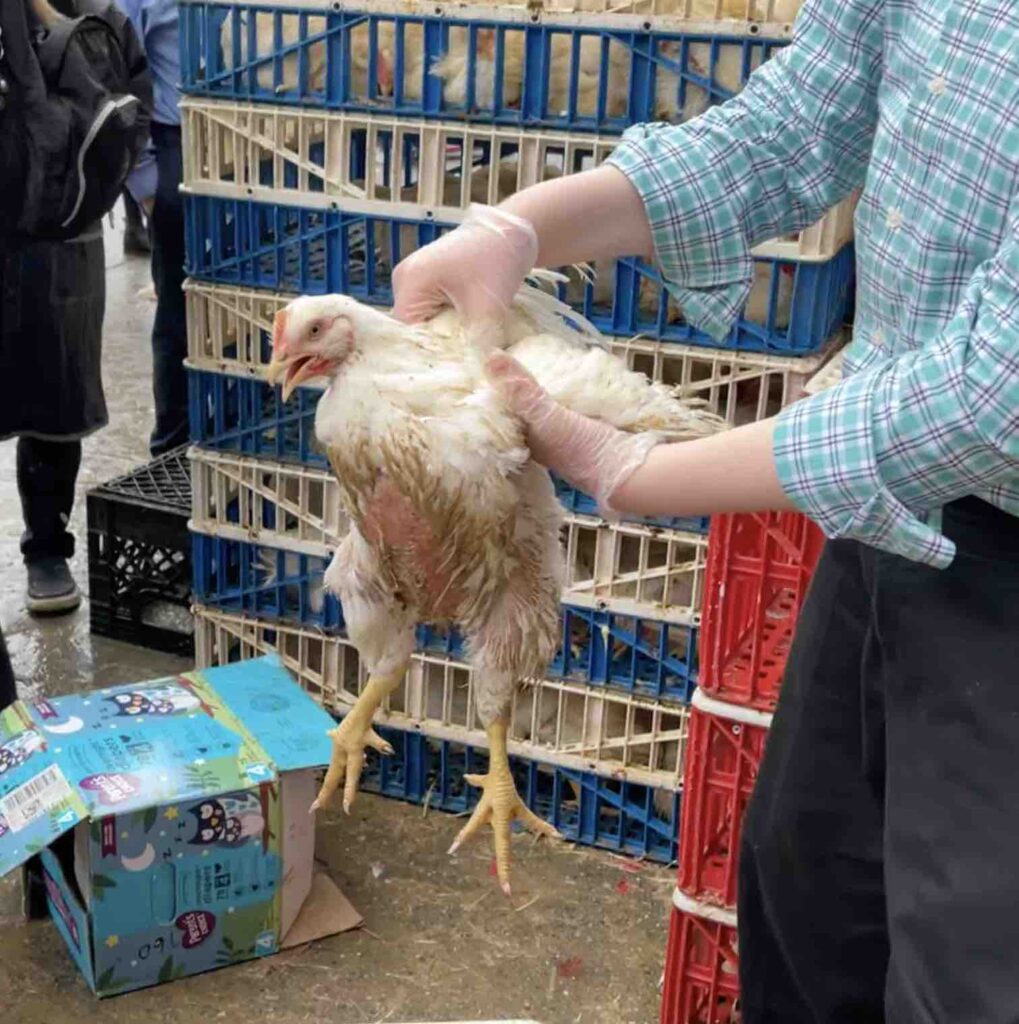
The chickens used in the Kaporos slaughter ritual are held in crates for up to several days with little to no food or water. Each year, activists find hundreds of dead chickens mixed in with the living.
The chickens are trucked into the city from factory farms; stored in crates for up to several days with little to no food or water; swung in the air as practitioners say a prayer; and killed in makeshift slaughterhouses erected on public streets without permits. Despite the lack of permits and multiple health code and animal cruelty violations, the NYPD provides many of the chicken vendors with barricades, floodlights and orange traffic cones in which the chickens are bled out onto the street. In some neighborhoods, the NYPD also cordons off public streets.
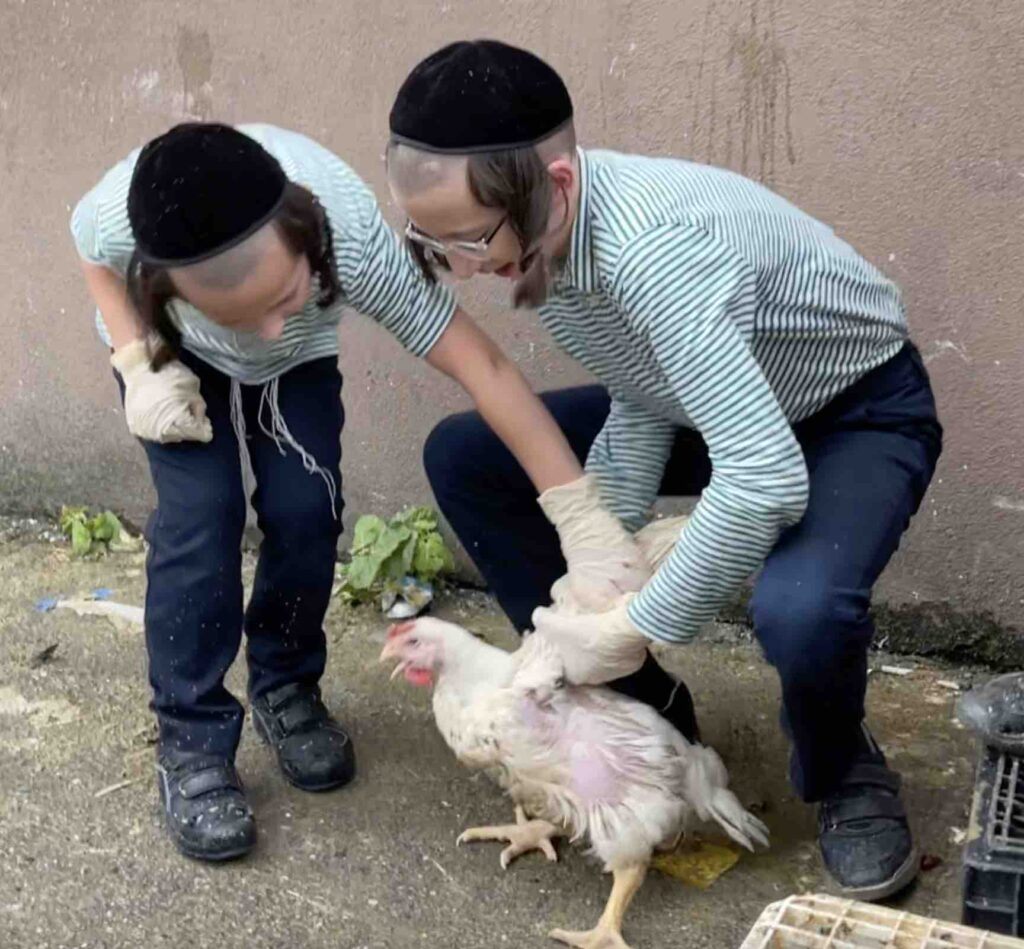
In Brooklyn, tens of thousands of Orthodox Jews swing chickens around their heads as part of an annual ritual animal slaughter called Kaporos.
For over 10 years, New York City’s animal rights community has engaged in protest, civil disobedience, litigation, lobbying, educational outreach and animal rescue in an effort to eliminate the practice and help the victims. Despite these efforts, Kaporos continues unabated because the practitioners represent a powerful voting bloc that can help make or break elections in New York.
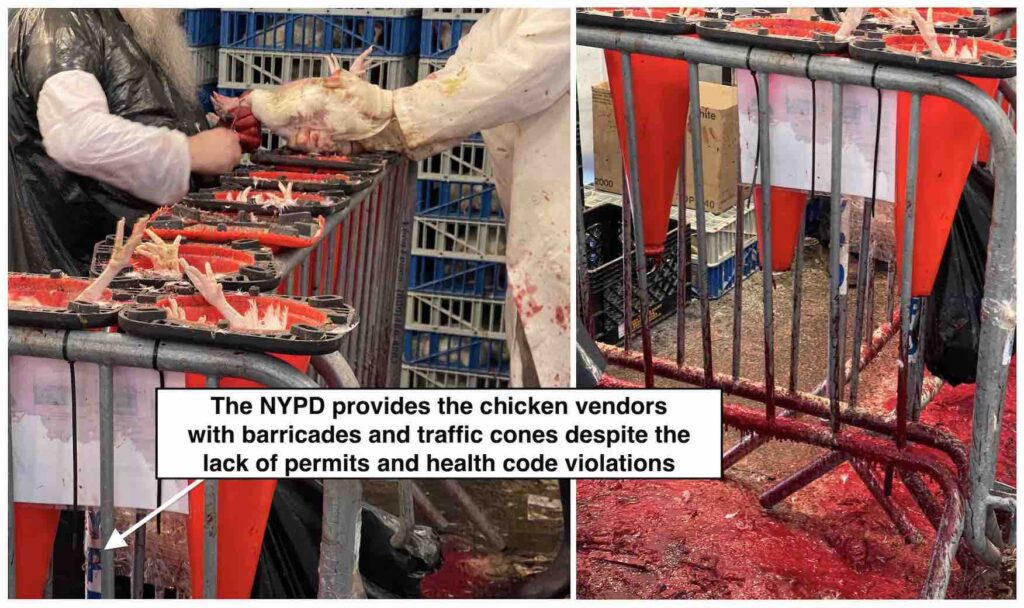
The city subsidizes Kaporos despite the fact that it violates multiple health code violations that put the public at risk of a zoonotic disease outbreak.
Making the Switch from Protests to Chicken Care
From 2010 to 2017, the Alliance to End Chickens as Kaporos, the organization that has led community efforts, staged protests at the largest Kaporos sites in Brooklyn, but the organization stopped because the practitioners doubled down on the use of chickens. In addition, many taunted activists by handling the chickens more aggressively. In 2018, the Alliance transitioned from protesting to providing the chickens with watermelon and water. The “chicken care” approach provides a bit of relief to the chickens, who would otherwise receive no nourishment, and it demonstrates to the practitioners that the animals are sentient.
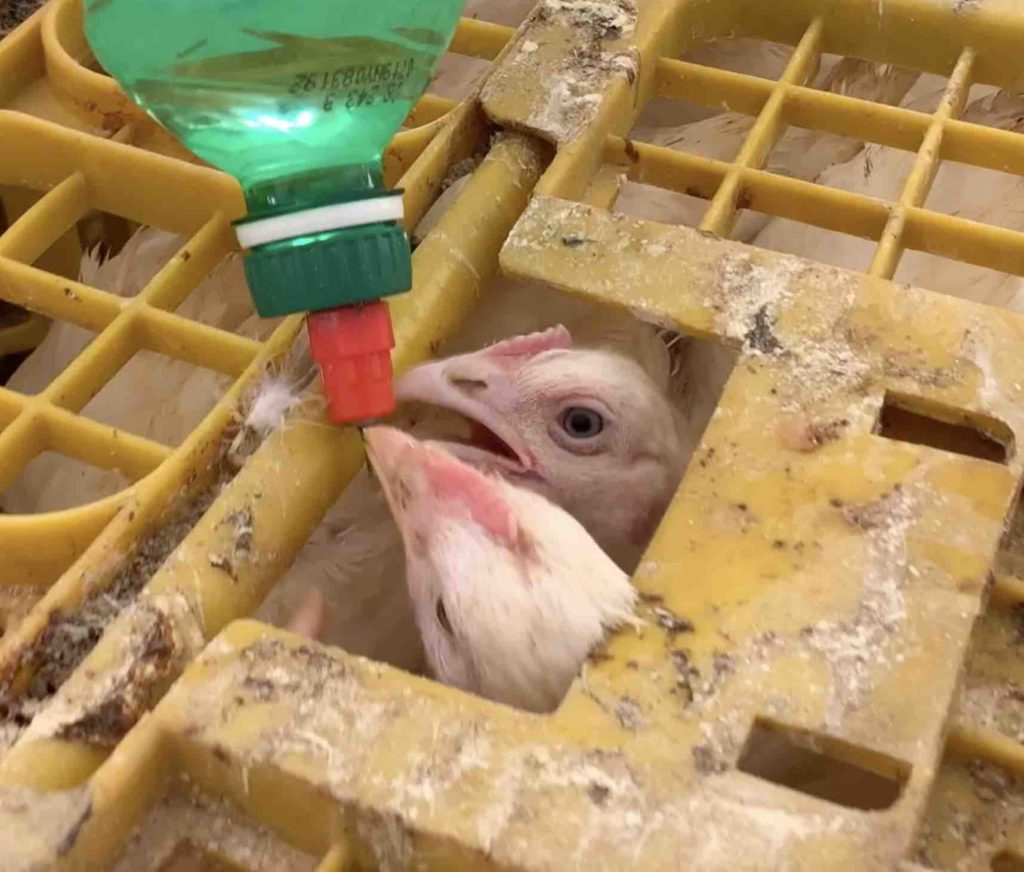
Animal rights activists provide water to some of the chickens who are stacked in crates for up to several days with no nourishment.
Putting the Public at Risk of a Zoonotic Disease Outbreak
The approximately 30 Kaporos sites in Brooklyn are, in effect, unregulated live animal markets where the customers physically handle the chickens, often without protective gear. This close contact could expose them to pathogens harbored by the chickens. Over the years, many activists who have come into physical contact with the chickens have contracted e. Coli and campylobacter.
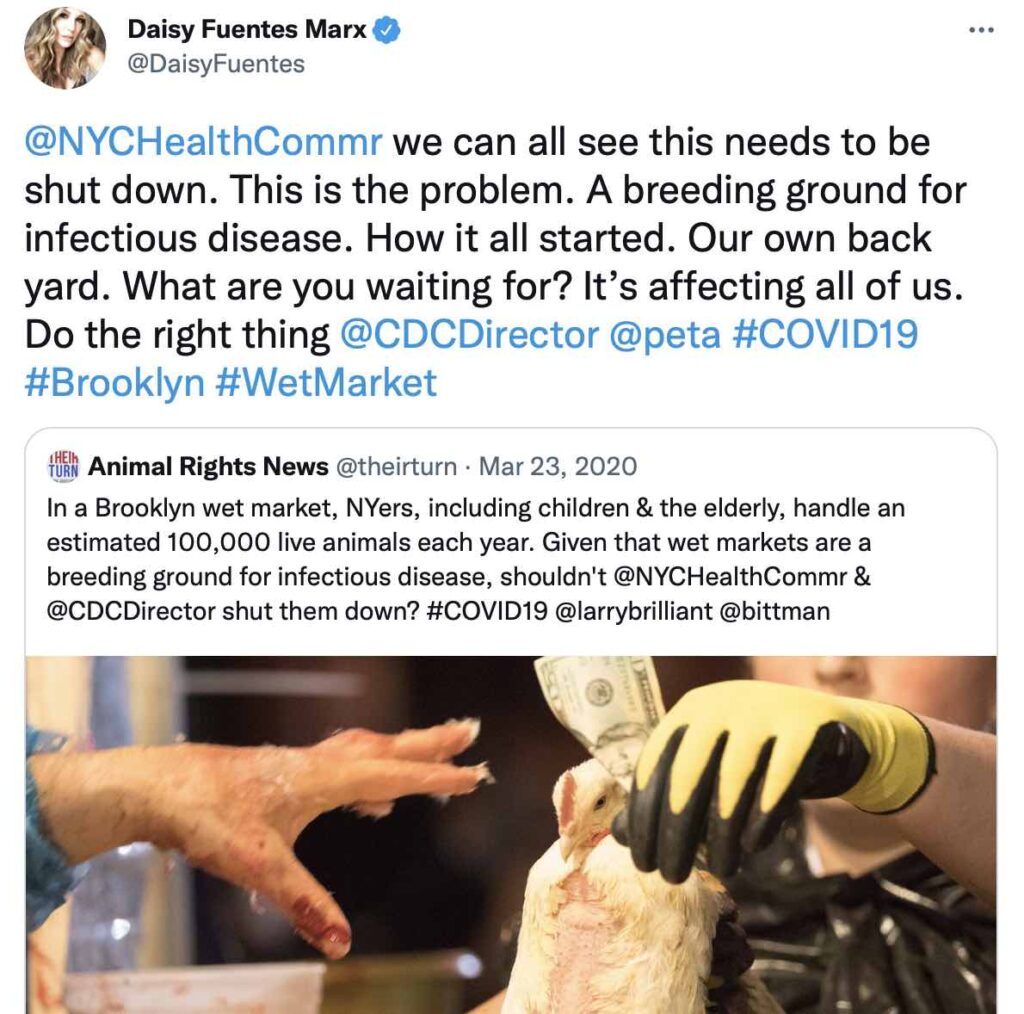
At the height of the COVID-19 pandemic, actress and model Daisy Fuentes Marx tweeted about the public health risks associated with Kaporos
According to a toxicologist who studied fecal and blood samples taken from the streets, Kaporos “constitutes a dangerous condition” and “poses a significant public health hazard.” If the living and dead chickens, who are crowded together in crates, harbor viruses that commingle and mutate into a strain that can be transmitted to humans, an avian flu could spread throughout the community and into the general public before it’s even detected.
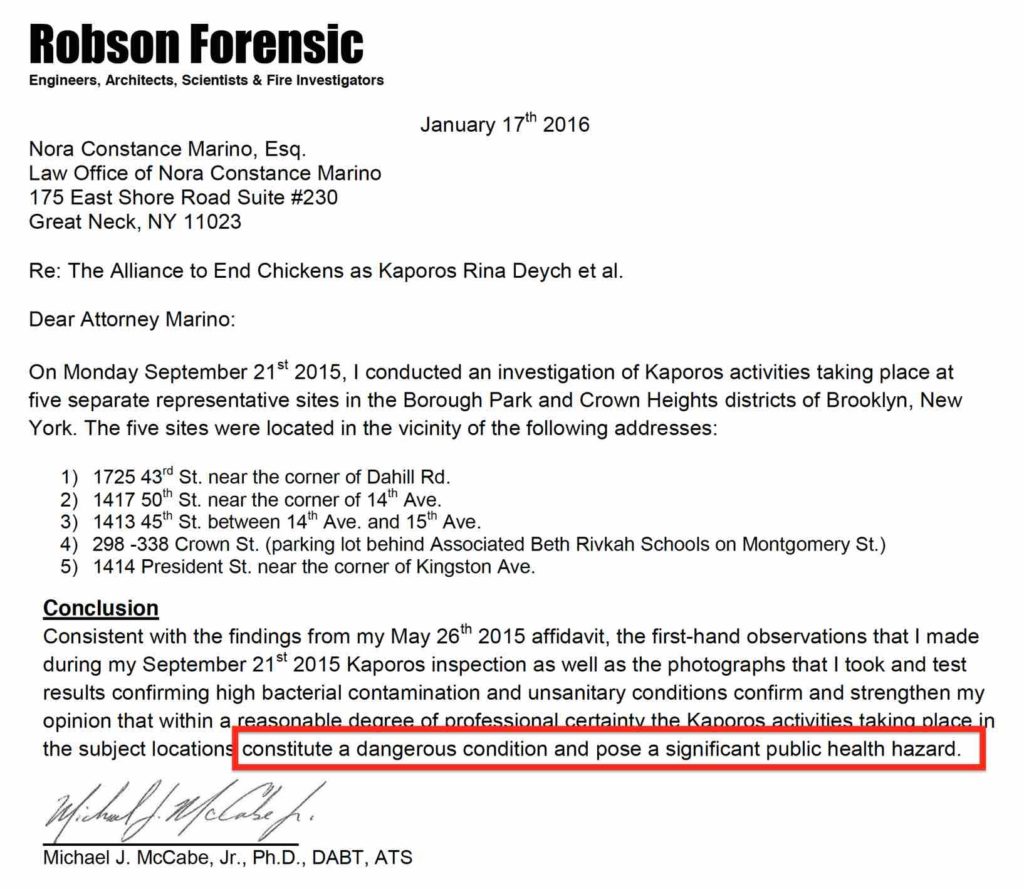
As part of lawsuit filed against NYC on behalf of Brooklyn residents negatively impacted by the health codes violations, attorney Nora Constance Marino hired a toxicologist to investigate the health risks associated with Kaporos and produce a report. Dr. Dave Chokshi and the NYC Health Commissioners who preceded him have refused to address the toxicology report.
Animal Rescue
During the 2021 Kaporos events, activists in New York City rescued 708 chickens, the most ever. At a triage center in Brooklyn, a rescue crew led by the Alliance to End Chickens as Kaporos and Tamerlaine Sanctuary (a refuge for farm animals in NJ) provided the chickens with wound care, antibiotics and nourishment before loading them into vans that transported them to sanctuaries around the country.
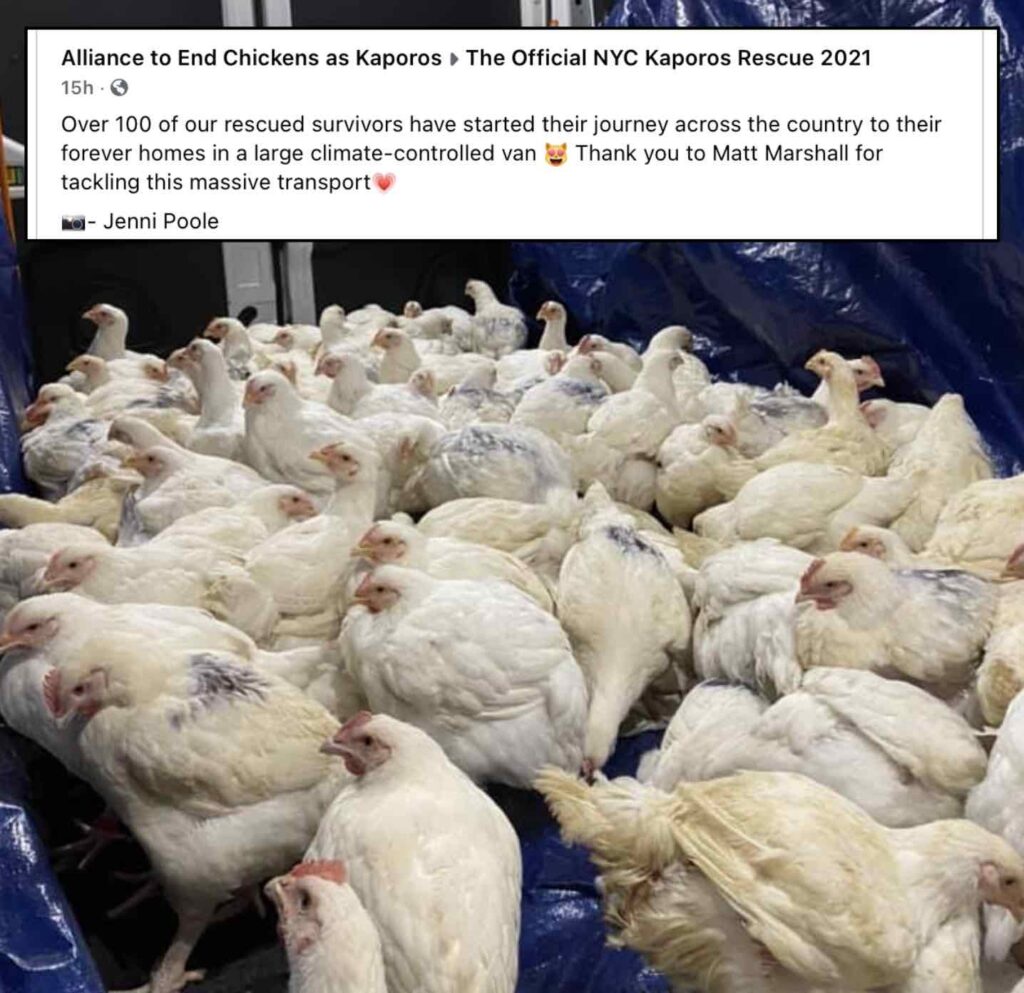
In the days leading up to Yom Kippur, activists with the Alliance to End Chickens as Kaporos rescued 708 chickens and transported them to farm animal sanctuaries around the country.
The rescuers also brought over 20 chickens to veterinarians for surgical procedures that totaled over $15,000. According to Jill Carnegie, a rescuer with the Alliance to End Chickens as Kaporos, the mortality rate of the rescued chickens who were brought to the triage center was the lowest ever.

The Alliance to End Chickens as Kaporos (a project run by United Poultry Concerns) rescued 708 chickens from slaughter during the 2021 Kaporos events in Brooklyn
A New Documentary Film
In September, Cavelight Films, a New York-based production company, released a highly-anticipated documentary film about Kaporos, The 12-minute film, Voting Bloc: Slaughter in the Streets of Brooklyn, takes viewers deep inside the insular Orthodox Jewish communities where Kaporos takes place and follows several animal rights activists who document the ritual and rescue animals.
The Campaign to End the Use of Chickens as Kaporos
In September 2017, animal rights activists in New York began calling on the New York City Department of Health to enforce the health laws violated during Kaporos, including the slaughter of animals in residential neighborhoods and the contamination of public streets with blood, feces and body parts. They were hopeful that the Health Commissioner, Dr. Mary Bassett, would shut down the mass ritual slaughter not only because of the well documented health risks and violations, but also because she presented herself as a social justice advocate who had regrets about not speaking out against other injustices when she had the platform to do so. When Dr. Bassett dismissed the activists’ concerns, they began protesting at her public speaking engagements. At several events, including a global public health conference at the New York Hilton, the disruptions forced Dr. Bassett to forfeit her presentation.
In August 2018, after being subjected to 10 months of unrelenting protests, Dr. Bassett resigned as Health Commissioner with three years left in her term and moved to Boston to take a job at Harvard’s T.H. Chan School of Public Health. Her departure was not the outcome that the activists sought, but it did demonstrate the power of protest, civil disobedience and pressure campaigns. Neither she nor the media acknowledged the role that the protests played in her decision to resign.
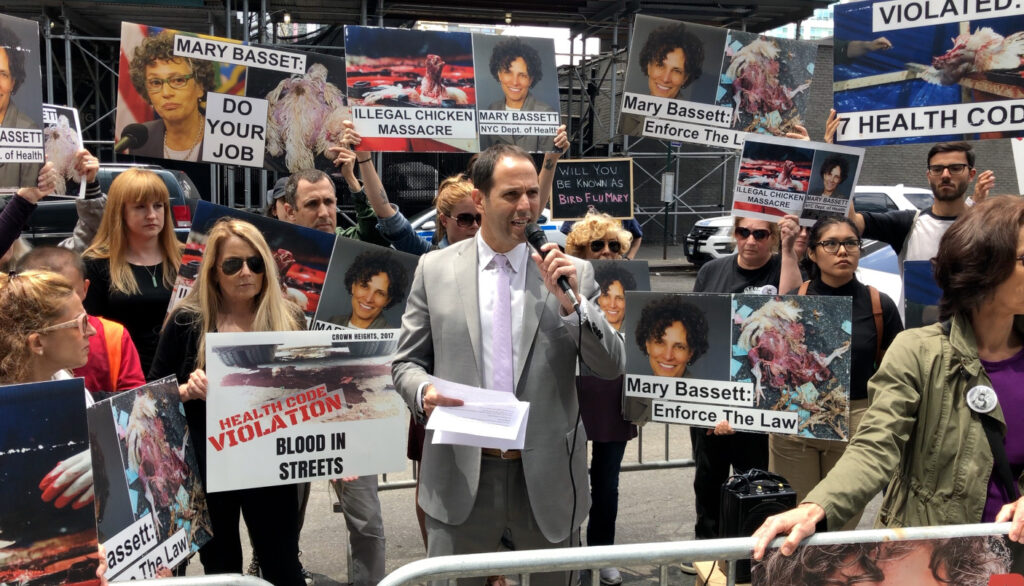
In 2018, animal advocacy groups in NYC held a press conference at the Department of Health calling on Health Commissioner Dr. Mary Bassett to enforce the city’s health codes that are violated during Kaporos, an annual ritual animal slaughter in which an estimated 100,000 chickens are killed in the streets of Brooklyn’s Orthodox Jewish neighborhoods.
While Dr. Bassett never did acknowledge her refusal to enforce her own health codes, she did publicly admit that she was constrained by politics. In anticipation of a protest during a presentation at the Boston University School of Public Health, she stated, “Those of us who work in government face the reality of the fact that the people who appoint us have to go back to the public and back to the ballot box to be reappointed, so there’s always going to be a need for advocacy from people outside of government. For someone who is passionately committed to many issues embraced by advocates, it can be difficult to acknowledge the role that I play as a political appointee. I can’t always be at the barricades.”
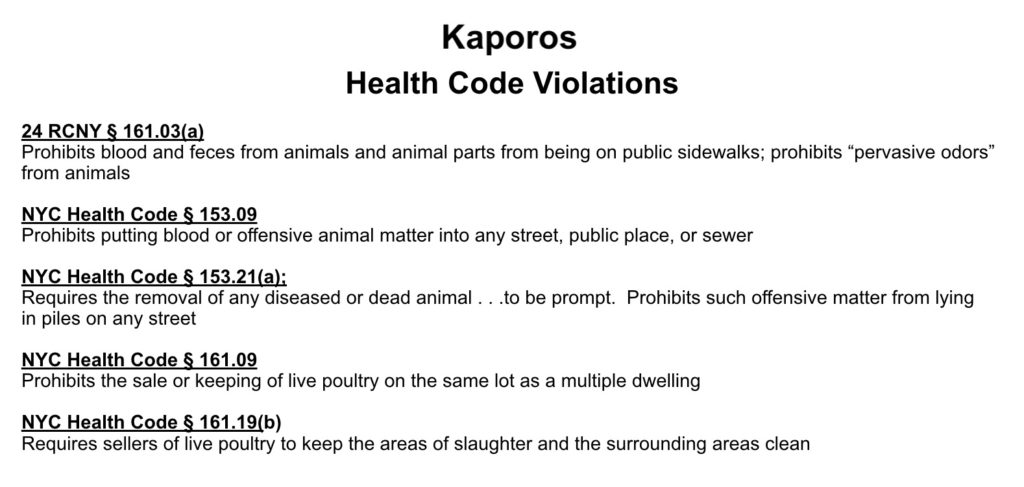
Multiple health codes are violated during Kaporos, a ritual animal sacrifice, but NYC Health Commissioners turns a blind eye because the practitioners represent a powerful voting bloc.
While most of the audience members did not know what Dr. Bassett was talking about, the animal rights activists who were present or watching the livestream did. In New York, many elected officials go to great lengths to support of the ultra-Orthodox (Haredi) Jewish communities because they represents a powerful voting bloc. Dr. Bassett’s boss, Mayor Bill de Blasio, undoubtedly forbade her from shutting down Kaporos, despite the fact that it violates so many laws, because it could have cost him future endorsements from that community. To appease her boss, Dr. Bassett prioritized politics ahead of public health.
In September 2021, New York Governor Kathy Hochul hired Dr. Bassett to serve as the state’s Health Commissioner, a position that once again gives her the authority to enforce health codes and take measures to protect the public health.
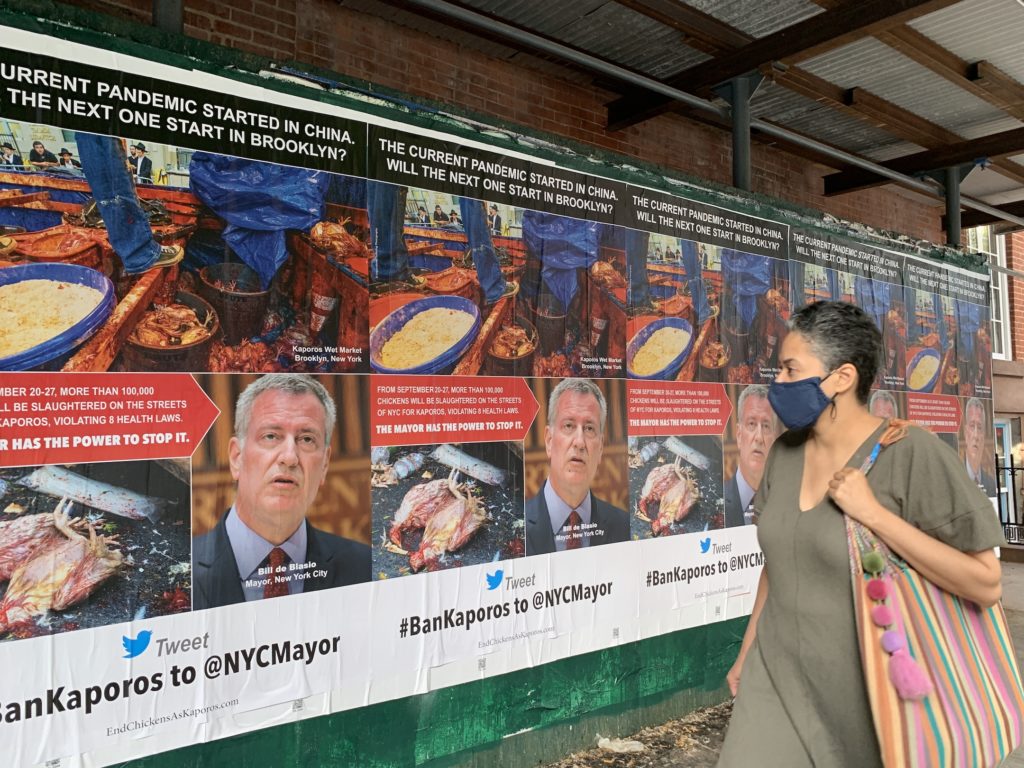
Animal rights activists plaster NYC with posters highlighting the risk of zoonotic disease transmission during Kaporos in 2020
When Dr. Bassett resigned in 2018, the activist community turned its attention to the Deputy Commissioner of Disease Control, Dr. Demetre Daskalakis. He seemed like an appropriate target, given the e. Coli and campylobacter infections and the toxicology report which outlined the public health risks. After he ignored letters requesting a meeting and refused to talk to advocates in the lobby of the Department of Health, activists staged two protests at a spin (cycling) studio he co-owned with his husband. After the second protest, he falsely accused protest organizer Donny Moss of assault and had him arrested. Instead of engaging in a discussion with the activists or simply enforcing the health codes, Dr. Daskalakis used his power as a high-ranking city official to silence and intimidate activists in order to prevent future protests at his spin studio.
Discomfort about Kaporos Among the Practitioners
After Yom Kippur, TheirTurn posted a Kaporos video in an Orthodox (Lubavitch) Facebook group with almost 8,000 members. The video, taken in the Crown Heights section of Brooklyn, shows bloody chickens flailing around in great distress after workers at a makeshift slaughterhouse sliced their throats and tossed them into the street. While several Lubavitchers argued that the chickens were dead despite their movements, the majority of people expressed anger about the cruelty and the reckless disregard for “God’s creatures.” Some also expressed concern about the chickens being discarded, as they are told from a young age that the chickens are donated to the poor.
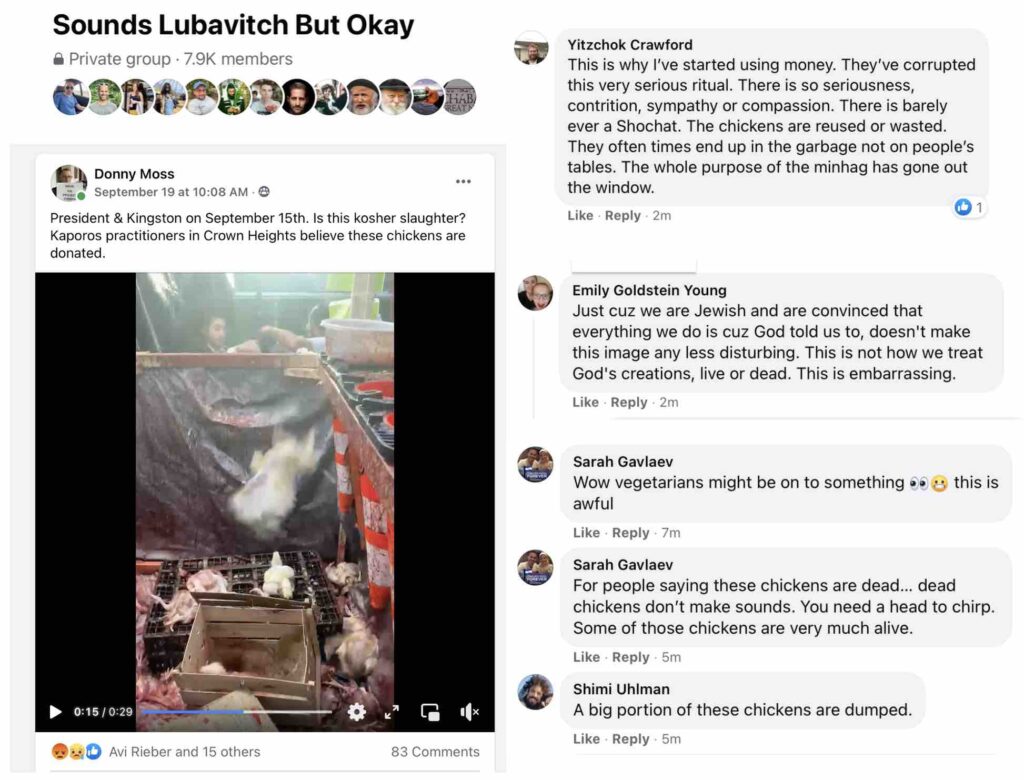
Video footage of chickens being tossed into the street while still alive after their throats were sliced generated angry responses from Lubavitcher Jews who are told that the chickens are donated to the poor.
During the 2021 Kaporos, the NYPD took the unprecedented step of shutting down two of the Kaporos sites after dozens of activists filed sanitation, animal cruelty and underage worker complaints with the city. While this enforcement act did nothing to help the chickens, who were transferred to other Kaporos sites, it did offer the activist community a glimmer of hope. Still, after years of protest and other forms of advocacy, many NYC activists have concluded that the mass ritual slaughter will continue until a deadly zoonotic disease outbreak forces city or state officials to shut it down. Until then, the animal rights community will continue to engage in chicken care and rescue to reduce the suffering and save lives.




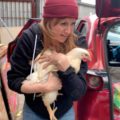
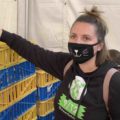
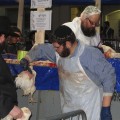

How was jail Donny? Did you MEAT anyone special?
This is a great ritual. Thanks for helping make it happen
This is a great ritual. What’s with the hatred?
Amazing how you fit all that hatred proproganada against Orthodox Jews in one article. I hate to hear what you think about gays.
It’s egregious how insular the Chasidic adults keep the children-
At a protest a few yrs ago some of the children seemed eager to discuss- but said their rabbis tell them animals don’t feel pain. One said what can we do…
They are not allowed to go on internet etc…to learn things for themselves and questioning in their communities is not encouraged.
Have to protest louder and more aggressively meet with lawmakers well in advance of Yom Kippur.
Disgraceful that animal sacrifice to appease the gods is condoned in this day and age.
Thank you for your excellent documentation of the chicken Kaporos ritual and the dedicated work of NYC activists and the Alliance to End Chickens as Kaporos Team of rescuers and strategists. I’m encouraged to see that at least some practitioners are “uncomfortable” with how cruelly the chickens are treated – deprived of food and water often for days, immobilized in transport crates, held inhumanely and painfully suspended by their delicate wings, and slaughtered and forced to die slowly in traffic cones disgracefully provided by the NYPD to aid and abet an event that is illegal on numerous counts! Their Turn is an invaluable source of information on all of this merciless madness and the campaign to end it in favor of charitable works and compassionate giving.
Terry, I wholeheartedly agree with you; one sin does not justify another. For that reason we must urge our State Representatives to consider Kaporos a major form of animal abuse … not to mention the major hygienic problems tied to the wanton practice. There is no doubt that the live markets where Kaporos takes place spread disease. And they are non-compliant with current health laws. Kaparos, with its pagan origins has no real place in Jewish tradition. It must end, once and for all.
I am brought to tears by people defending cruelty and saying it’s in Gods name. So heartbreaking to teach your children it’s okay to hurt a living thing.
I really don’t understand how anyone could think that commiting the sin of cruelty to animals is a way of atoning for sin! Looking at the photos taken, it’s so upsetting to see that children are being taught to do this.
What they do is clearly animal abuse as well as a major health hazard. The live markets are responsible for the spread of diseases; among them Covid. It also sends a message to children that animal abuse is okay. State Representatives should be urged to ban Kaporos. End the horror now and the bad name it gives to Jewish who do not partake in the appalling practice